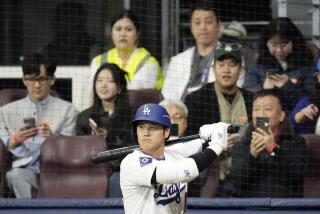Japan Already Pushing Hard for 2002 Bid : Soccer: Former England player Charlton lends support. South Korea is main competition.
World Cup ’94 has two games left. World Cup ’98 is only a glimmer in France’s eye.
But don’t view the 8 a.m. news conference Friday called by World Cup Japan 2002 as premature.
The committee to bring the event to Japan is four years old, has enlisted the former president of Nissan as its chairman and Friday produced two Diet members--Japanese congressmen--to sit in silent solidarity with Japanese soccer officials before the world’s press.
The political and industrial clout of the Japanese was on display because, to some extent, the Japanese, who have never qualified for the event, are behind their primary competition for the 2002 Cup, South Korea.
But, they say, they are gaining ground quickly. Fifteen Japanese cities--not including Tokyo--are already building new stadiums in anticipation of the 2002 World Cup.
FIFA wants the tournament in Asia, and when it is awarded in 1996 by FIFA’s executive committee Japan or South Korea will get it.
“It’s Asia’s time,” said Bobby Charlton, one of two former British soccer players to be knighted and under contract as an adviser to World Cup Japan 2002. “South America has had it, now North America, and Europe again will have it in 1998.”
Charlton said Saudi Arabia might compete for the Cup and that a possible Colombian bid might be in the works. But newcomers to the 2002 race would be hopelessly behind the Asian nations, and although FIFA eventually wants to see the World Cup in Africa, the growth of the sport in the Far East makes the 2002 competition a two-horse race.
“FIFA wants soccer to be the world’s game, and I think the feeling is that the time is right to go to Asia,” he said. “After that, the time likely will be right to go to Africa.
“The concern is that it be done right, that Asia put on a good show. And, certainly, I think the Japanese are most capable of that.
“They have the population, they have the finances and they have the ability to mobilize on such a scale.”
The Japanese certainly have the bullet trains and airlines to zip from site to site and the communications systems to handle any press crush imaginable.
What they don’t have is Chung Mong-Joon, the president of the Korean Football Assn. and the recently elected vice president of FIFA, a position with considerable sway over who gets the Cup and who does not.
South Korea has qualified for the World Cup four times, including the last three. Japan has yet to make it. And South Korea is coming off the glow of the 1988 Olympics, staged without incident in the shadow of a hostile North Korea.
As Chung writes in the bid literature, if Korea gets the Cup, “it will no doubt contribute greatly to reunifying South and North Korea. . . . This, I believe, will be a way to uphold the spirit of the World Cup.”
But as 15 Japanese cities build stadiums, South Korea is still looking for 15 cities for what will be a 32-team tournament.
Said Charlton: “The number of cities and breadth of (Japan) is perfectly suited for the 32-team format. A lot of countries really don’t have enough major cities to host the event. I would think that would be Korea’s primary problem.”






